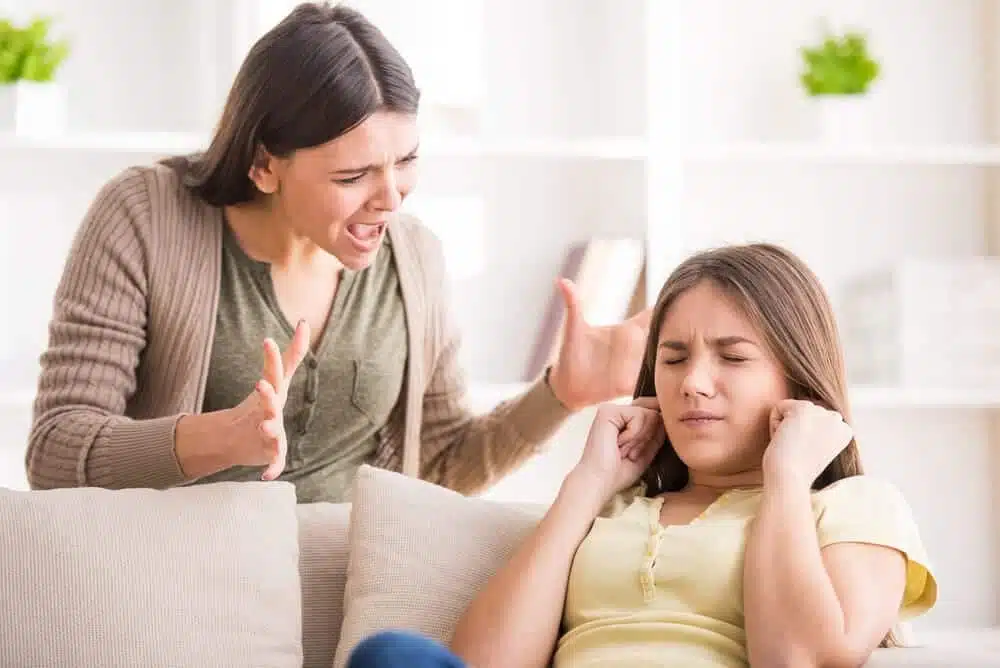
Parents Yelling at Teens & Kids: Effects, Alternatives, and Repairing Relationships
- Parenting
- September 12,2024
- BY Beachside Teen Staff
- 0 Comments
Parents Yelling at Teens & Kids: Effects, Alternatives, and Repairing Relationships
Yelling is often described as a natural reaction in cases when people are defending themselves. However, many people misuse yelling. We can all agree that communication with teenagers and understanding their behavior is difficult. Parents often say that it’s all about their hormones and the changes in their body and mind, but many of them simply can’t restrain themselves and often yell at their teens.
Modern teens, even more than teens in the past, don’t like authorities. They are stubborn and often do things that require a reaction from their parents. This is quite natural because they need attention, but they also need to prove that they are growing up and that they are independent. However, walking outside with inadequate clothes, staying out late, spending too much time on the computer, bad grades and other things drive their parents nuts. In a situation like this, it is so hard NOT to yell at your teenager.
Yelling can provide a temporary relief and it is normal to yell at teens sometimes. However, this type of verbal communication doesn’t bring any good results in the long run. So, parents should not be ashamed when they notice that they are yelling at their kids because this is what every parent does. However, this should not become a habit or some sort of pattern. Doing anything in excess is usually a bad idea and screaming and yelling – too often – is not a solution.
Screening is commonly done when a person isn’t in control of their situation. Parents certainly can develop skills that will help them deal with their crazy, wild teenager whenever they are pushing their limits. These skills will not silence a parent, nor lower the volume of their voice, but rather address their teenager’s behavior, without screaming, but rather in a healthy and productive manner.
What Happens When Parents Yell at Kids?
Yelling at kids is a reaction that often stems from frustration, but it can have lasting negative effects on their emotional and psychological well-being. When parents yell, it triggers a stress response in children and teenagers, activating their fight-or-flight instincts. This can lead to emotional withdrawal, heightened anxiety, and increased defiance rather than compliance. Over time, repeated exposure to yelling parents can erode trust, making it harder for kids and teens to communicate openly and feel safe expressing their emotions.
The effects of yelling on teens go beyond immediate emotional distress. Studies show that constant parents yelling at teens can contribute to low self-esteem, difficulty regulating emotions, and even long-term behavioral problems. Parents yelling at kids may intend to discipline, but excessive yelling often leads to resentment rather than understanding. Instead of fostering respect, parents yelling can create a home environment filled with tension and fear. Finding healthier communication methods, such as calm discussions and setting clear expectations, can help rebuild trust and create a more positive parent-child relationship.
Parents Need To Establish Rules
It is a good idea to create rules and specific consequences related to your teen’s behavior. The screaming will immediately diminish because you have a set of rules and consequences to point to, so to speak. If you want to make sure that these rules and consequences will work, depending on the teen, you might think about including your teenager in the process. It is difficult (even for teenagers) to break the rules that they have created. This way, parents can also show that they respect their kids’ opinion.
Furthermore, when establishing consequences for inappropriate behavior, be sure that the penalty matches the level of “crime”. For example, in case your teenager didn’t prepare for a test, you can ground them for one weekend. Grounding them for the whole summer is, well, ridiculous. It’s also a good idea to give them a chance to “redeem” themselves. Maybe they can apologize directly to someone they’ve hurt or do something good for them.
Parents Are Role Models
We should not forget that parents are role models for their children, even very young children. So, it is not shocking to find that your teen is smoking if you are a heavy smoker. It’s imperative to improve yourself as a person and avoid bad habits (ideally at all times, but especially in the presence of your teen). Next time you catch yourself screaming at your child, try to reflect what is angering you? Why is their behavior even happening in the first place? Is it possible that they learned this adverse behavior from you? Is it perhaps so recognizable and that is precisely why it annoys you so much?
Praise The Child!
For the next two days, count how many times you screen at your kid versus how many times you compliment them. Parents should never forget that their teenagers need praise, so make sure to compliment their good behavior. Even though they look tough on the outside, they need support, compliments, positive and negative reinforcement and most importantly lots of love.




